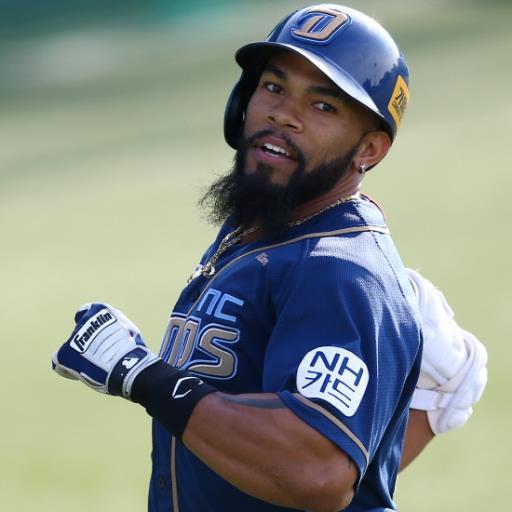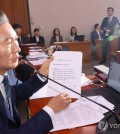- California Assembly OKs highest minimum wage in nation
- S. Korea unveils first graphic cigarette warnings
- US joins with South Korea, Japan in bid to deter North Korea
- LPGA golfer Chun In-gee finally back in action
- S. Korea won’t be top seed in final World Cup qualification round
- US men’s soccer misses 2nd straight Olympics
- US back on track in qualifying with 4-0 win over Guatemala
- High-intensity workout injuries spawn cottage industry
- CDC expands range of Zika mosquitoes into parts of Northeast
- Who knew? ‘The Walking Dead’ is helping families connect
Why 2015 KBO MVP Eric Thames should come back to the MLB
By Brian Han
In case you didn’t know, ex-Major League Baseball (MLB) outfielder Eric Thames put up some otherworldly numbers during the Korean Baseball Organization’s (KBO) 2015 regular season.
Over the course of 142 games, the 29-year-old held a .381 average, .497 on-base percentage and a .790 slugging percentage, leading the league in every single one of those categories.
On top of that, he hit 47 home runs and stole 40 bases making him the first player ever in the 33-year history of the league to put together a 40-40 season.
Most recently, Thames was named the league MVP, and with those stats, rightfully so. He’s the third non-Korean to earn that honor.
Only one other player truly rivaled his performance, and that would be none other than the Nexen Heroes’ first baseman Park Byung-ho who recently fetched a $12.85 million bid from the Minnesota Twins. If the two parties can come to an agreement, which is likely, he’ll be taking his talents to the U.S.
Park Byung “Home Run” (as U.S. envoy Mark Lippert prefers to call him) had six more home runs and six more RBIs than Thames. Those are the only stats where the South Korean edged out the American. He also only had 10 steals, and will most likely not make a defensive contribution as a designated hitter if he plays in the MLB according to ESPN.
So why on earth is Thames playing baseball in South Korea when a player that’s in some ways less valuable than him is on the verge of making the switch for essentially more money and less work.
Maybe it’s the allure of batflips, perhaps hitter-friendly parks or even the food of which he has spoken so fondly.
But before he signed with the NC Dinos in 2013, he didn’t know of the team’s or even the league’s existence.
“Before the Dinos contacted me, I had no idea about the KBO or Korean baseball in general,” he said back in 2013 during an interview with his own team. “Once I was contacted, I started doing some investigation, some research, and I loved how the players played ball, I loved the fans and the atmosphere.”
It might come off like a canned response, reasons any new player would give to a new team in a new country. But in his statement rang some kind of truth.
“You’ve got to have fun, this is a game after all,” he said. “I lost sight of that for a few years, but now I’ve learned it again.”
It wasn’t a hollow statement. Something clicked as evidenced by his debut KBO season in which he hit .343 with 37 home runs and 121 RBIs.
The Houston Astros were the last MLB club to roster Thames, and according to Steve Adams over at MLBTradeRumors.com, the club let him go in 2013 so that he could begin fulfilling his new contract obligations across the Pacific.
The next question is why did he choose to leave in the middle of his prime at just 26 years old?
Thames was your quintessential AAAA player. Otherwise known as someone who looks like the next big thing at the AAA level, but struggles once he hits the major league level.
For example, in his AAA career, he batted .312/.389/.506 with 23 home runs and 123 RBIs in 759 at-bats. In the majors, those numbers dipped to .250/.296/.431 in 633 at-bats.
He has a slightly higher salary in the KBO and that’s without taking possible performance bonuses into account. He gets to play every single game, and with the numbers he’s putting up, there’s no fear of being sent down to the minor leagues.
This should start to sound eerily familiar to baseball fans. Back in 1989, Cecil Fielder, otherwise known as Prince Fielder’s dad to younger generations, left the U.S. at the age of 24 after establishing himself as a AAAA player.
He hit for a .294 average with 100 home runs in 1,914 at-bats in the minors, but couldn’t quite put it together once the Toronto Blue Jays called him up.
So he went to Japan. They offered him more money after all, and on top of that, he had the opportunity to start and play every game. He went on to bat over .300 with 38 home runs in his only season with the Hanshin Tigers.
The rest is history.
Fielder came back to the states, signed with the Detroit Tigers and proceeded to blast 51 home runs the following year becoming the 11th player ever to hit the 50-home-run mark in the history of the MLB.
There have been other players like San Francisco Giants’ pitcher Ryan Vogelsong who have followed a similar path and found renewed success upon their return, but none seem as appropriate for comparison as Cecil “Wild Bear” Fielder — a nickname he earned overseas.
It’s true that the KBO and Japan’s Nippon Professional Baseball (NPB) have histories of producing different levels of play, but consider this.
Pittsburgh Pirates’ infielder Kang Jung-ho dominated in the KBO’s 2013 season, then flew overseas and proved to the baseball world that talent and skill can translate between leagues. Not on an equal level, but more along the lines of viewing the KBO like something between the AA and AAA levels.
This all happened within Thames’ first year. So even though it might not have been on his radar to eventually return to the major leagues when he first flew over to South Korea, it should be now.
There’s no multi-million dollar posting fee for him. There’s no cultural adjustment, no language barrier. He’s proven he can stay healthy after missing just two games in the last season. He’s played in the majors before and has taken his abilities to the next level at least in the KBO. He can hit, he can run. The list goes on and on.
What he symbolizes is a very low-risk investment opportunity. Lower than Kang Jung-ho, lower than Park Byung-ho, and with a reported salary of $800,000 according to the KBO, this man could be a steal.
It’s only been two years, but perhaps it’s time for him to come back to the MLB.
















